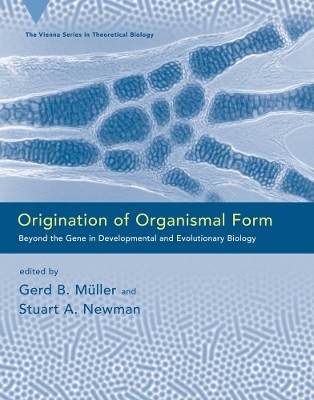
Origination of Organismal Form
Beyond the Gene in Developmental and Evolutionary Biology
Seiten
2003
MIT Press (Verlag)
978-0-262-13419-4 (ISBN)
MIT Press (Verlag)
978-0-262-13419-4 (ISBN)
- Titel ist leider vergriffen;
keine Neuauflage - Artikel merken
A more comprehensive version of evolutionary theory that focuses as much on the origin of biological form as on its diversification.
The field of evolutionary biology arose from the desire to understand the origin and diversity of biological forms. In recent years, however, evolutionary genetics, with its focus on the modification and inheritance of presumed genetic programs, has all but overwhelmed other aspects of evolutionary biology. This has led to the neglect of the study of the generative origins of biological form.
Drawing on work from developmental biology, paleontology, developmental and population genetics, cancer research, physics, and theoretical biology, this book explores the multiple factors responsible for the origination of biological form. It examines the essential problems of morphological evolution-why, for example, the basic body plans of nearly all metazoans arose within a relatively short time span, why similar morphological design motifs appear in phylogenetically independent lineages, and how new structural elements are added to the body plan of a given phylogenetic lineage. It also examines discordances between genetic and phenotypic change, the physical determinants of morphogenesis, and the role of epigenetic processes in evolution. The book discusses these and other topics within the framework of evolutionary developmental biology, a new research agenda that concerns the interaction of development and evolution in the generation of biological form. By placing epigenetic processes, rather than gene sequence and gene expression changes, at the center of morphological origination, this book points the way to a more comprehensive theory of evolution.
The field of evolutionary biology arose from the desire to understand the origin and diversity of biological forms. In recent years, however, evolutionary genetics, with its focus on the modification and inheritance of presumed genetic programs, has all but overwhelmed other aspects of evolutionary biology. This has led to the neglect of the study of the generative origins of biological form.
Drawing on work from developmental biology, paleontology, developmental and population genetics, cancer research, physics, and theoretical biology, this book explores the multiple factors responsible for the origination of biological form. It examines the essential problems of morphological evolution-why, for example, the basic body plans of nearly all metazoans arose within a relatively short time span, why similar morphological design motifs appear in phylogenetically independent lineages, and how new structural elements are added to the body plan of a given phylogenetic lineage. It also examines discordances between genetic and phenotypic change, the physical determinants of morphogenesis, and the role of epigenetic processes in evolution. The book discusses these and other topics within the framework of evolutionary developmental biology, a new research agenda that concerns the interaction of development and evolution in the generation of biological form. By placing epigenetic processes, rather than gene sequence and gene expression changes, at the center of morphological origination, this book points the way to a more comprehensive theory of evolution.
Gerd B. Mu ller, is Professor of Zoology and Head of the Department of Theoretical Biology at the University of Vienna and President of the Konrad Lorenz Institute for Evolution and Cognition Research. Stuart Newman is Professor of Cell Biology and Anatomy at New York Medical College.
| Reihe/Serie | Vienna Series in Theoretical Biology |
|---|---|
| Zusatzinfo | 62 illus.; 62 Illustrations |
| Sprache | englisch |
| Maße | 178 x 229 mm |
| Gewicht | 898 g |
| Themenwelt | Naturwissenschaften ► Biologie ► Evolution |
| Naturwissenschaften ► Biologie ► Genetik / Molekularbiologie | |
| ISBN-10 | 0-262-13419-5 / 0262134195 |
| ISBN-13 | 978-0-262-13419-4 / 9780262134194 |
| Zustand | Neuware |
| Haben Sie eine Frage zum Produkt? |
Mehr entdecken
aus dem Bereich
aus dem Bereich
Komplette Neuübersetzung. Mit einem Nachwort von Josef H. Reichholf.
Buch | Hardcover (2018)
Klett-Cotta (Verlag)
CHF 67,20
Wie die Vernichtung der Arten unser Überleben bedroht - Der …
Buch | Softcover (2023)
Penguin (Verlag)
CHF 20,95


